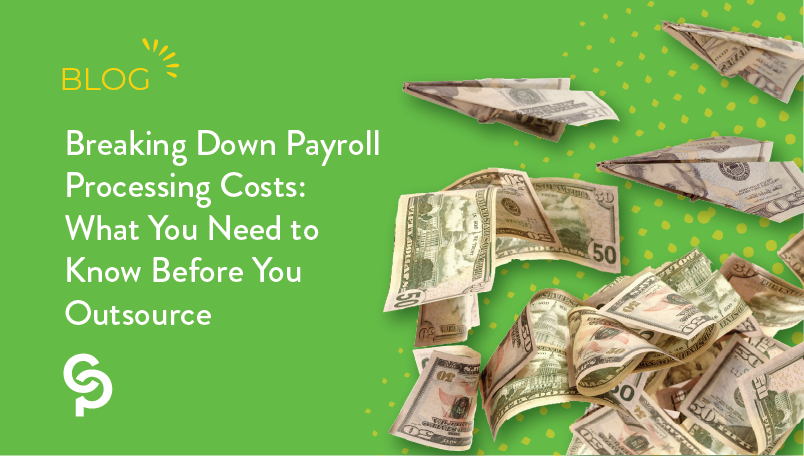Breaking Down Payroll Processing Costs: What You Need to Know Before You Outsource

Payroll is one of those back-office tasks that’s both essential and deceptively complex. If you’ve ever spent hours crunching numbers, double-checking tax codes, or troubleshooting a missed paycheck, you know exactly what we mean.
That’s why more businesses—especially small and mid-sized ones—are exploring payroll outsourcing. But before making the leap, a big question tends to pop up:
“How much does payroll processing really cost?”
The answer? It depends. In this post, we’re unpacking what goes into payroll processing costs, how pricing is structured, and whether outsourcing is the right investment for your business.
What Exactly Is Payroll Processing?
Payroll processing goes far beyond cutting checks. It includes:
- Calculating wages and salaries
- Withholding the right taxes
- Issuing payments (direct deposit or paper check)
- Filing tax reports and ensuring compliance
- Handling benefits, bonuses, and deductions
Whether you're managing a team of five or fifty, each of these steps must be accurate and timely. That’s where payroll services come in—offering expertise, automation, and peace of mind.
In-House vs. Outsourced Payroll: A Quick Comparison
Running payroll in-house might sound like a cost-saving option, but it often comes with hidden expenses—software fees, staff hours, training, and compliance risks.
Outsourcing payroll transfers that responsibility to professionals, reducing errors and freeing up your time to focus on your business—not tax tables.
So… What Does Payroll Processing Cost?
The short answer: anywhere from $30 to $1,000+ per month depending on your provider, team size, and service needs.
But that’s just the surface. Let’s break it down.
1. How Pricing Structures Work
Payroll service providers use different pricing models. Here are the most common ones:
- Per Payroll Run: You’re charged each time you process payroll. If you pay employees weekly, that’s four charges a month.
- Per Employee, Per Month (PEPM): A flat monthly rate per employee, regardless of how often payroll is run.
- Flat Rate: One predictable monthly fee covering all payroll activities.
💡 Tip: Don’t just go for the lowest price—choose a structure that aligns with how often you pay your team and what kind of support you’ll need.
2. Size of Your Business
Naturally, the more employees you have, the higher the cost—especially with per-employee pricing. But size also affects complexity.
Larger businesses may require more advanced features: multi-state compliance, integrations, or custom reporting. Smaller businesses may have simpler needs—and that usually means a smaller bill.
3. How Complicated Is Your Payroll?
Payroll isn’t one-size-fits-all. Here’s what can make it more complex—and costly:
- A mix of W2 employees and 1099 contractors
- Multiple pay rates or shift differentials
- Overtime and commission structures
- Benefits deductions and contributions
The more moving parts, the more work your provider has to do—which can increase your costs.
4. Are You Adding Extra Services?
Many payroll providers offer additional services beyond just payroll, including:
- Time and attendance tracking
- Benefits administration
- PTO tracking and scheduling tools
- HR support
- Workers’ Comp and retirement integrations
These add-ons can be incredibly valuable—but they’re not always included in the base price. Be sure to evaluate what your business truly needs (and what you can skip).
5. Support Levels Matter, Too
Some providers charge extra for premium support or faster response times. Others, like ConnectPay, include personalized service at no added cost.
When evaluating payroll partners, ask about support:
- Will you have a dedicated contact?
- Is support local or offshore?
- Are there extra fees for help during peak times?
Great support doesn’t just save time—it helps you avoid compliance mistakes and payroll headaches.
Is It Worth It?
Absolutely—if you choose a provider who understands your business and delivers real value.
Outsourcing payroll means:
✅ Less time spent on admin
✅ Fewer errors and missed deadlines
✅ Better compliance with tax laws
✅ Peace of mind knowing experts are on your side
At ConnectPay, we make payroll simple, transparent, and personalized. Plus, you’ll gain access to our Connected Payroll™ network—giving you a direct line to local pros in HR, bookkeeping, Workers’ Comp, and more. No upselling. No pressure. Just smart connections when you need them.
Final Thoughts
Payroll isn’t just about getting people paid—it’s about doing it right. Understanding the cost is the first step toward making an informed decision.
Whether you’re ready to outsource today or just gathering info, we’re here to help.
📞 Schedule a call with a ConnectPay specialist to see how much time, money, and stress we can save your business.






